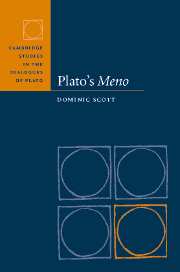Book contents
- Frontmatter
- Contents
- Acknowledgements
- Introduction
- Part I
- Part II
- Part III
- Chapter 11 The method of hypothesis: 86c–87c
- Chapter 12 Virtue is teachable: 87c–89c
- Chapter 13 Virtue is not teachable: 89e–96d
- Chapter 14 Virtue as true belief: 96d–100b
- 15 Irony in the Meno: the evidence of the Gorgias
- Chapter 16 Meno's progress
- Conclusion
- Appendices
- References
- Index of ancient passages
- General index
Chapter 13 - Virtue is not teachable: 89e–96d
Published online by Cambridge University Press: 29 September 2009
- Frontmatter
- Contents
- Acknowledgements
- Introduction
- Part I
- Part II
- Part III
- Chapter 11 The method of hypothesis: 86c–87c
- Chapter 12 Virtue is teachable: 87c–89c
- Chapter 13 Virtue is not teachable: 89e–96d
- Chapter 14 Virtue as true belief: 96d–100b
- 15 Irony in the Meno: the evidence of the Gorgias
- Chapter 16 Meno's progress
- Conclusion
- Appendices
- References
- Index of ancient passages
- General index
Summary
INTRODUCTION
Having argued that virtue is knowledge and hence teachable, Socrates begins to express some doubts:
Soc. I'm not retracting the statement that virtue is teachable if it's knowledge. But see whether you think I'm right to doubt that it is knowledge. Tell me this: if something is teachable, not just virtue, isn't it necessary for there to be teachers and learners of it?
Men. I think so.
Soc. And conversely, if there were no teachers or learners of something, wouldn't we be right in surmising that it isn't teachable?
Men. That's true. But do you think there are no teachers of virtue?
(89d3–e5)The assumption that there must actually be or have been teachers and learners of something if it is to be considered teachable is crucial for what follows: throughout 89e–96d, Socrates scours the scene to find teachers of virtue, first with the new character Anytus, then with Meno; and when the search proves to be unsuccessful, he concludes that virtue is not after all teachable (and hence not a form of knowledge). But this assumption is easily questioned: the fact that there happen to be no teachers of virtue does not rule out the possibility that it might in principle be taught.
One might think that Socrates has covertly changed the subject at issue. In discussing the opening of the work, I said that Meno's question could be read in three different ways.
- Type
- Chapter
- Information
- Plato's Meno , pp. 161 - 175Publisher: Cambridge University PressPrint publication year: 2006



